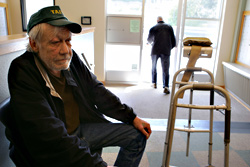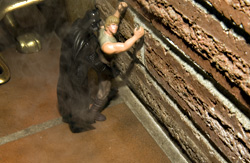The already strange case of King County Sheriff’s Deputy Ferenc Zana, whose roommate was charged recently with shooting and killing a Kenmore convenience store clerk, is getting stranger. In 2001, the deputy made a presentation at a conference in El Paso, Texas, that was devoted to “remote viewing,” a supposedly clairvoyant way of tracking people or objects.
On a videotape of his presentation, titled Remote Viewing—Police Applications—Do’s & Don’ts, Zana identifies himself as a KCSO deputy and states that he will “explain how to work with the police department if you are a psychic and want to help.”
“The badge behind the title is the King County Sheriff’s official badge,” Zana says on the videotape purchased on the Web by Seattle Weekly. “I carry one.” KCSO policies prohibit public appearances by department personnel without permission and prohibit use of symbols of the job in a public way.
Remote viewing is a system used to locate or identify a missing person or object, according to Paul Smith, vice president of the International Remote Viewing Association. Smith likens it to clairvoyance. On the Web, remote viewing is often referred to as psychic spying. It was tried by the U.S. Army in the 1970s and later dropped, says Smith.
As odd as the method sounds, a KCSO spokesperson says Zana’s participation at the conference is not the problem. “He can talk about whatever,” says Deputy Travis DeFries. “The issues are the badge and representation of himself as a deputy.”
DeFries says remote viewing is not used by KCSO. Zana, a 20-year veteran, did not respond to a request for comment, but in the video it’s clear he embraces remote viewing as an investigative tool.
Zana first came to public notice in August when his roommate, Christopher Bistryski, was charged with using Zana’s personal handgun to kill a convenience store clerk. KCSO is investigating Zana’s role in that incident. A separate investigation into the remote-viewing videotape has been closed by KCSO’s internal affairs unit and forwarded to Zana’s precinct commander for review and recommendation of discipline. Discipline could range from a letter in the deputy’s file to termination and should be determined within the next two weeks, according to department sources.
Zana has been in trouble before. In 1991, internal affairs recommended that he be fired after an incident in which Zana was found to have given alcohol and his car to two minors who later had an auto accident. At the time, King County Sheriff Sue Rahr, then an internal affairs lieutenant, wrote in a memo that Zana “does not possess the integrity to wear the uniform.”
In 1989, Zana was found sleeping in his car during a police standoff. A year later, he was investigated for misuse of a KCSO long-distance telephone account.







